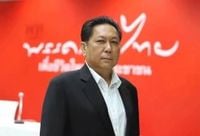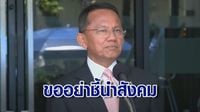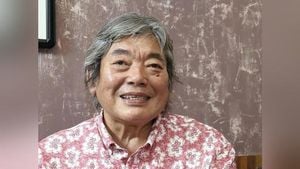In a politically charged atmosphere, Thailand's Health Minister, Samasakdi Thepsuthin, has urged caution against premature conclusions regarding the Medical Council's decision to punish three doctors linked to the treatment of former Prime Minister Thaksin Shinawatra. The council's ruling has sparked significant public interest and speculation, but Thepsuthin emphasized that the formal process has yet to begin.
On May 9, 2025, Thepsuthin stated, "I understand that there are pressures and suggestions that I will halt the Medical Council's decision. However, we must respect the legal framework, which allows us 15 days from the date we receive the council's resolution to make a decision." He highlighted the importance of waiting for the official documents to arrive before proceeding with any evaluation.
As the minister clarified, the Medical Council's findings have not yet reached him, leaving him unaware of the specifics of the case. He expressed concern over the potential for political misinterpretation of the situation, stating, "I understand that the results of the Medical Council's investigation will be linked to political narratives, creating confusion in society. I ask that we do not lead the public to assumptions before the facts are clear."
In a parallel development, former Prime Minister Thaksin, who has become a controversial figure since his return to Thailand, continues to be a topic of intense discussion. Wisutthi Chaiyanarun, a member of the Pheu Thai Party and Chairman of the Government Coordinating Committee for Joint Government Affairs, remarked on May 10 that Thaksin's influence on the current government should not be overstated. "Thaksin is not in a position to control government functions, and while there may be consultations, he does not interfere directly in government operations," Wisutthi noted.
Wisutthi also addressed concerns about the upcoming meeting of Pheu Thai MPs scheduled for May 13, where the topic of Thaksin's health and his role in the party may be discussed. He reiterated that the party’s agenda would focus on budgetary issues and governance rather than on Thaksin himself.
Meanwhile, Donald Trump, the former President of the United States, has signaled a desire for peace in Ukraine, calling for a ceasefire between Russian President Vladimir Putin and Ukrainian President Volodymyr Zelensky. On May 9, during a press conference, Trump expressed his hope for a 30-day ceasefire agreement, stating, "I have a message for both sides: end this stupid war." His comments come as the U.S. Embassy in Kyiv warned of potential air attacks in the coming days, advising American citizens to be prepared.
Trump's statements reflect his ongoing interest in international diplomacy, particularly as he embarks on a tour of the Middle East, which includes visits to Saudi Arabia, the UAE, and Qatar. Caroline Lewitt, a White House spokesperson, confirmed that discussions regarding a potential meeting between Trump and Putin would not take place in the immediate future, despite ongoing efforts to facilitate dialogue between the two nations.
Andrey Yermak, head of Zelensky's office, disclosed that he had discussions with U.S. officials, including Senator Marco Rubio, about the ceasefire proposal. Yermak emphasized the importance of reaching an agreement that addresses the ongoing conflict, highlighting that the situation remains a priority for both Ukrainian and U.S. leadership.
As tensions continue in Ukraine, the political landscape in Thailand remains equally complex. The intertwining of Thaksin's legacy with current political dynamics raises questions about governance and accountability. Observers note a persistent narrative that suggests Thaksin's return to the public sphere is an attempt to reclaim influence over Thai politics.
Critics argue that Thaksin's presence, even as a private citizen, could overshadow the current government led by his daughter, Prime Minister Paetongtarn Shinawatra. The perception that Thaksin's shadow looms large over the administration has prompted questions about the effectiveness of the current leadership and its ability to assert independence.
Political analyst Natthawut Saikua voiced concerns regarding the implications of Thaksin's influence, stating, "If the Prime Minister cannot speak for herself, what does that say about her leadership?" This sentiment reflects a growing frustration among constituents who seek a more decisive and autonomous government.
As the political narratives unfold, the role of media in shaping public perception cannot be overlooked. The portrayal of Thaksin, from a former leader to a figure of contention, illustrates the complexities of Thai politics. The ongoing discussions surrounding his health and potential involvement in governmental affairs continue to evoke mixed reactions among the populace.
In conclusion, the intersection of Thaksin's legacy, the ongoing political maneuvering within the Pheu Thai Party, and international diplomatic efforts led by figures like Trump underscore the multifaceted nature of contemporary governance in Thailand and beyond. As the nation navigates these turbulent waters, the voices of its leaders and citizens will play a crucial role in shaping the future.





